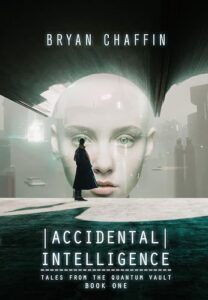
The fourth annual Self-Published Science Fiction Competition (SPSFC4) has advanced to the semifinals, where my team’s two semifinalists will join four others in one of the competition’s two semifinal groups, each of which will be read by multiple judging teams in order to select a top three to advance to the finals. My third read of the round was Accidental Intelligence by Bryan Chaffin, a cyberpunk thriller with a strong recommendation from J.W. of Team Red Stars.
Accidental Intelligence opens with a military prologue that prompts a ton of unanswered questions before shifting to the noir-style detective lead who will be the focus of most of the book. But what seems to be a run-of-the-mill missing persons case involving someone heavily entangled in virtual reality culture reveals the beginnings of a conspiracy that extends to the highest reaches of society and may threaten the entire future of humanity.
I don’t tend to like noir-style narration, so I was pretty apprehensive about starting Accidental Intelligence, and I was pleasantly surprised to find the voice compelling and the story utterly immersive. There’s mystery and danger from the get-go, and the writing style flows easily and encourages the reader to keep flipping the pages. It’s clear from early on that the conspiracy will involve powerful people, but as long as the shape of that conspiracy is opaque, Accidental Intelligence is gripping and bingeable.
But as the pieces start to fall into place in the final third, the overall story loses a little bit of momentum. There are a few reasons for this, starting with the villains being a little bit flat. Their motivations aren’t unusual within the genre, so it’s not so much that it detracts from the story as it just doesn’t provide the kind of payoff that would elevate what came before it. A little more distracting is the return of a figure from the lead’s past who is so over-the-top it can be difficult to suspend disbelief. It’s a sideshow that’s meant to provide some interpersonal drama but mostly just interrupts the momentum of the main plot.
And finally, there’s a chaotic ending that just doesn’t quite build up the tension before the big moments. Of course, fast-paced and chaotic endings aren’t necessarily unusual for a cyberpunk thriller, but after the first half of the novel so carefully established the stakes—small-scale as well as large—the ending moves quickly enough that scenes that probably ought to be devastating get lost in the shuffle. It resolves enough of the plot to keep the reader from feeling cheated, but the pacing coupled with the closing sequel hook just make the ending feel a little bit dissatisfying after what had come before.
Accidental Intelligence goes a long way on the strength of the setup. It establishes the tension early, and the storytelling is good enough to make this my favorite opening half of anything I’ve read in this competition this year—despite a subgenre I typically don’t care for. But the back half doesn’t quite live up to the promise of the opening, with relatively flat villains, a distracting secondary character, and a bit too quick a pace. There’s enough here to leave the reader on a largely satisfying note, but the final third takes Accidental Intelligence from very impressive to decidedly uneven.
Recommended if you like: cyberpunk thrillers with noir stylings.
Can I use it for Bingo? It’s hard mode for Self-Published and also fits Hidden Gem.
Overall rating: 13 of Tar Vol’s 20. Three stars on Goodreads.
SPSFC score: 6.5/10 for my personal score. The official team score will be determined in concert with my teammates.
